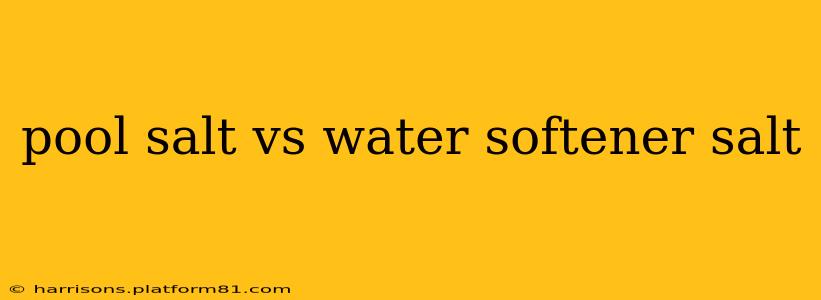Choosing the right salt for your needs can be confusing, especially when faced with the seemingly similar options of pool salt and water softener salt. While both are sodium chloride (NaCl), there are crucial differences that impact their effectiveness and safety in their respective applications. This guide will break down the key distinctions to help you make the informed choice.
What is Pool Salt?
Pool salt, also known as swimming pool salt, is specifically formulated for use in chlorinators that generate chlorine for sanitizing swimming pools. While the base ingredient is sodium chloride, the purity level is a critical factor. Pool salt needs to be highly refined to minimize impurities that could damage the chlorinator cell or cloud the pool water. These impurities can include calcium, magnesium, and other minerals. High purity ensures efficient chlorine production and prevents equipment malfunctions and water issues.
What is Water Softener Salt?
Water softener salt, also known as potassium chloride or sodium chloride, is used in water softening systems to regenerate the ion-exchange resin. The purpose here is to remove minerals like calcium and magnesium from hard water, making it softer and improving the efficiency of appliances. While often sodium chloride (like pool salt), water softener salt may contain higher levels of impurities than pool salt. These impurities aren't typically harmful to the water softener system but are less desirable for use in pool chlorinators.
Key Differences Between Pool Salt and Water Softener Salt:
Here's a comparison table highlighting the key differences:
| Feature | Pool Salt | Water Softener Salt |
|---|---|---|
| Purity | Very high (typically 99.9% NaCl) | Can vary, usually less pure than pool salt |
| Impurities | Minimized to prevent equipment damage | Higher tolerance for impurities |
| Grain Size | Often finer to dissolve more quickly | Larger granules are common |
| Application | Swimming pool chlorination | Water softener regeneration |
| Cost | Generally more expensive | Usually less expensive |
Can I Use Water Softener Salt in My Pool?
No, using water softener salt in your pool is generally not recommended. The lower purity levels can lead to several problems, including:
- Cloudy water: Impurities in the water softener salt can cloud your pool water, reducing its clarity.
- Chlorinator damage: The higher level of impurities can clog or damage your pool's chlorinator cell, leading to costly repairs or replacements.
- Reduced efficiency: The less pure salt may not generate chlorine as effectively, requiring more salt and potentially not achieving adequate sanitation.
Can I Use Pool Salt in My Water Softener?
Using pool salt in your water softener is possible but not necessarily ideal. While it might work, it's generally unnecessary and potentially more costly. Water softeners are designed to handle a certain range of impurities, and the higher purity of pool salt doesn't offer any significant advantage. The finer grain size might dissolve faster, but this isn't a crucial benefit. Sticking to the appropriate water softener salt is the recommended approach.
What About Potassium Chloride Water Softener Salt?
Potassium chloride is an alternative to sodium chloride in water softeners, offering a lower sodium option for individuals on low-sodium diets. However, potassium chloride is not suitable for use in pool chlorinators. It won't generate chlorine.
How to Choose the Right Salt?
The choice is simple: always use pool salt for your pool chlorinator and water softener salt for your water softener. Using the wrong type of salt can result in performance issues, costly repairs, and potentially compromise the safety of your swimming pool. Read the product labels carefully to ensure you're selecting the correct salt for your specific application.
This information is for general guidance only and does not constitute professional advice. Always consult the manufacturer's instructions for your specific equipment.
